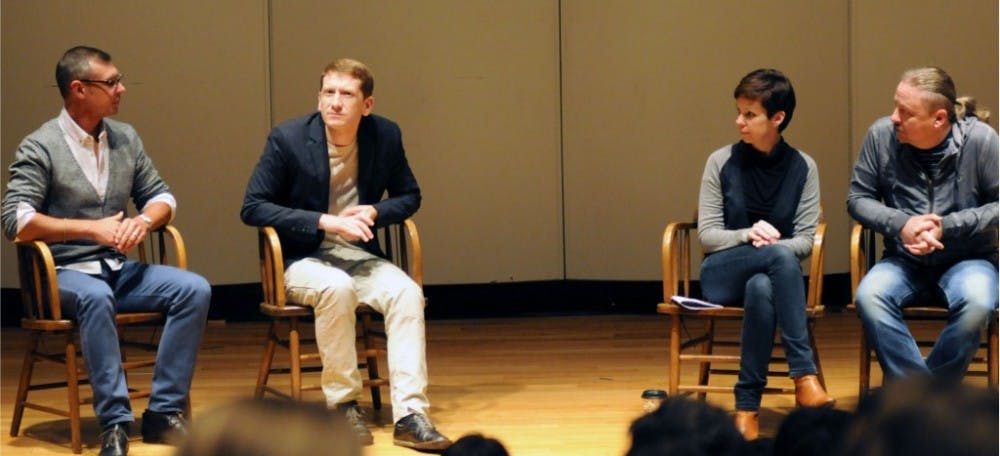Natalia Koliada fights for her people’s freedom through protests, marches, lectures of awareness and — the art of theater? Friends refer to Koliada, cofounder and artistic director of the theater, as the “unstoppable force” or “the little dynamo.” Being involved with the Belarus Free Theatre, previously based in Minsk, means staying quick on her feet, even after she and three others were exiled from the country.
Koliada worked to express her passion during a lecture Feb. 27 in Yeager Recital Hall, when the exiled members of Belarus Free Theatre spoke for their suffering countrymen.
“It all began on March 30, 2005, when we announced the opening of our contemporary drama,” said Nikolai Khalezin, Koliada’s husband and cofounder of the theater. “Because Belarus’ dictatorship prohibited our truthful work, we were forced to go underground in order to write the plays we wanted to write.”
In Belarus, 1,000 to 1,200 people disappear annually. Nine hundred people commit suicide on average in a given year. And Belarus is the fifth country in line to go extinct because so many people want to get out. These facts and many others are taught through the Belarus Free Theatre’s performances.
“We want to be able to say everything to anyone everywhere, which is the reason I use theater to speak out,” said actor and interpreter Yuri Koliada. “People cannot stop us, because otherwise, what’s the point if they take that away? That would be it. That would be throwing away democracy.”
In deciding what to perform, the group spent time analyzing the difficulties and hardships in Belarus. They came to address the questions of what they wanted to say and how they could relay that information.
“My concern that I wanted to address in our performances was to understand and try to reflect why nobody cares about Belarus and why European politicians pretend that there is no such country,” Natalia said.
Their first play, “4.84 Psychosis” by English playwright Sarah Kane, portrayed the effects of depression, homosexuality and suicide — all taboo topics in Belarus.
Other performances portrayed various social issues and modern life outside Belarus that the government denies. Actors and actresses mime movements and dances to portray struggles of freedom of sexuality, abortion and the enforced death penalty, Khalezin said.
“When in Belarus, we used to perform secretly in barns, the woods or in private apartments so authorities wouldn’t know, but we had to change our location frequently,” Natalia said. “Authorities even started going to cafes and homes ahead of us telling owners that their businesses would fail if they hosted our shows.”
In the underground business, the support of patrons and friends for security is essential and has gotten Belarus Free Theatre through a lot of near misses.
“Risks of persecution are always high in Belarus,” said Vladimir Shcherban, director at the Belarus Free Theatre. Having the support and signatures of Steven Spielberg, Sir Tom Stoppard and Mick Jagger certainly helped in many cases, but authorities arrested the entire theater company and 700 others in December 2010.
“They cracked down,” Natalia said. “I was arrested and got bailed out. Protesters and politicians got up to 15-year sentences. They sat in jail for simply expressing their views on the situation in Belarus and protecting free and fair elections in our country. Many of us arrived in America shortly after by redirecting through other countries and changing our names because it wasn’t possible by way of our own country.”
Not only had their plays been outlawed and canceled by the authorities, but now they too were exiled from their home country. But the last thing the performers want is pity.
“We would hate for somebody to consider us victims, because we’re not victims,” Natalia said. “We chose to live our lives this way. It’s cool to be artists and activists. We’re used to the repressions.”
But their children, relatives and spectators also face the consequences.
“In my case, my father was a professor and he lost his job because of me,” Natalia said.
It’s a price the performers are willing to pay. Natalia, Yuri, Khalezin and Shcherban now travel all around the world spreading awareness and fighting for Belarus through theater. From London to Los Angeles to Sydney, they are giving lectures and hosting workshops.
More than 5,000 people have seen the performances in Belarus and thousands more internationally and online, but Belarus still has plenty of progress to make. The Free Theatre won't stop until it sees success.
“It’s not scary,” Yuri said. “Artists have to do in the same way that journalists have to do, even if it’s dangerous. We just did it and still do it. I mean, if not us, then who else?”


